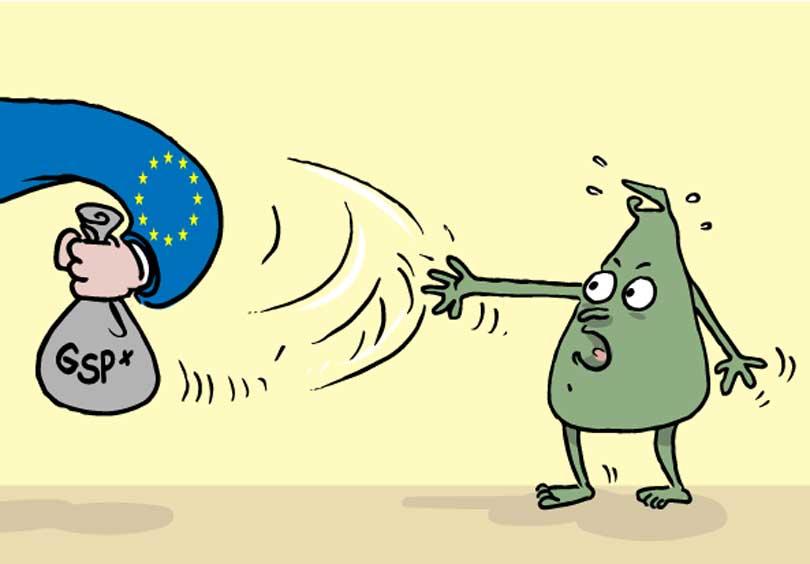Reply To:
Name - Reply Comment

The European Union Parliament on June 10 has adopted a resolution seeking the temporary withdrawal of Sri Lanka’s GSP+ status. The resolution said “The European Parliament calls on the Commission and the EEAS (European External Action Service) to use the GSP+ as a leverage to push for advancement on Sri Lanka’s human rights obligations and demand the repeal or replacement of the PTA, to carefully assess whether there is sufficient reason, as a last resort to initiate a procedure for the temporary withdrawal of Sri Lanka’s GSP+ status and the benefits that come with it.”
This is the second time the tax concessions awarded to Sri Lanka are to be withdrawn by the 27- Nation political and economic bloc on the same grounds. When the EU withdrew the concessions last time in May 19, 2010, it laid down 15 conditions, almost all of which were concerning human rights and good governance, to restore the country’s GSP+ status. The then government of President Mahinda Rajapaksa rejected those conditions describing them as “Clearly inconsistent with Sri Lanka’s sovereignty.”
It was following the reversal of some of the policies of the Rajapaksa regime pertaining to human rights and good governance by the last government led by a coalition headed by the United National Party (UNP), that the GSP+ concessions were restored by the EU in May 2017. It must be recalled that the previous government was on the process of enacting a new anti-terrorism Bill in place of highly contentious current PTA and curtailed the executive President’s powers through the Constitutional Council and Independent Commissions.
The EU is Sri Lanka’s second-largest trading partner after China and its second main export destination. The European Parliament reminding these benefits incurred by Sri Lanka in its resolution had said “The GSP+ scheme offered to Sri Lanka has made a significant contribution to the country’s economy, from which exports to the EU have increased to EUR 2.3 billion making the EU Sri Lanka’s second-largest export market.”
Despite Sri Lanka still having time to positively engage with the European leaders and save the tariff privilege offered by the EU, it is doubtful that the government gives up its stance on issues which the European Parliament was concerned about, especially the application of the PTA. The resolution has also cited two specific cases – the arrest and detention of Attorney-at-law Hejaaz Hizbullah and poet Ahnaf Jazeem. While expressing concern also over the detention of former CID director Shani Abeysekara, it “Urges the Government of Sri Lanka to immediately give those detained a fair trial on valid charges, and if there are no charges, to release them unconditionally”
The irony is that Sri Lanka had ratified the 27 international conventions related to human rights, labour rights, protection of the environment and good governance to be qualified for the EU trade concessions and the conflict between Sri Lanka and the EU stems from the application of those conventions to specific cases within the country. It is pertinent to note that this resolution marks the second international stricture brought about against the Sri Lanka’s human rights situation this year, the first being the resolution adopted by the United Nations Human Rights Council (UNHRC) in March. Besides, the resolution is also based on the said UNHRC resolution, among others.
Deprivation of the GSP+ status means that Sri Lanka would have to have a disadvantageous competition with the other recipients of the same concessions in terms of the trade with European countries, especially the export of apparels. Everything expected by the world powers could not sometimes be fulfilled by Sri Lankan government. However, at a time when a pandemic is ravaging the economy, country could sometimes be benefitted, at least for some extent, by prudent engagement with the relevant world leaders.